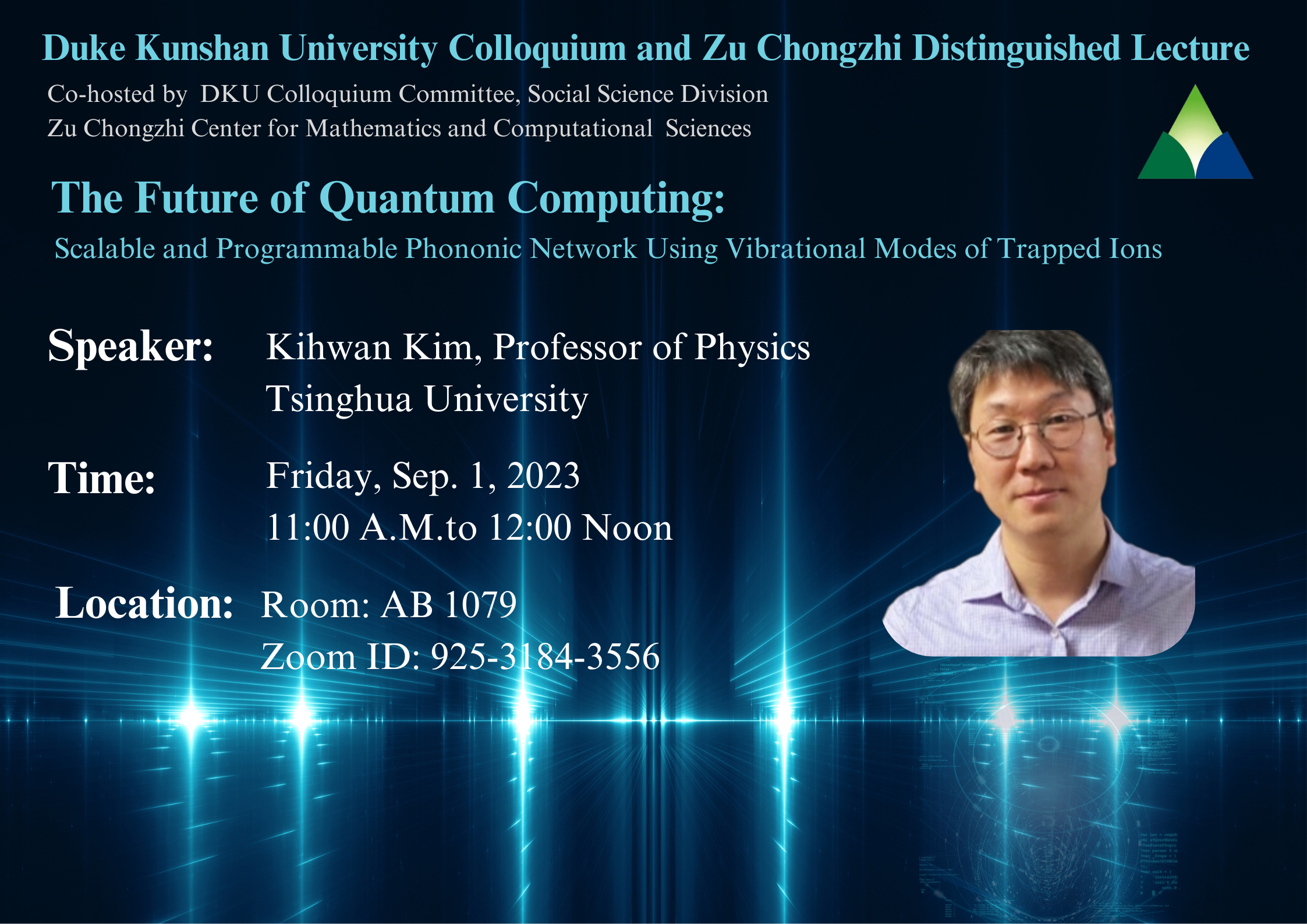Event details

Event Type: Duke Kunshan University Colloquium and Zu Chongzhi Distinguished Lecture
Hosting Department: Co-hosted by DKU Colloquium Committee, Social Science Division, and Zu Chongzhi Center for Mathematics and Computational Sciences
Talk title: The Future of Quantum Computing: Scalable and Programmable Phononic Network Using Vibrational Modes of Trapped Ions
Date and Time: Friday, Sep. 1, 2023, 11:00 AM to 12:00 PM
Zoom: 925 3184 3556
Room: AB 1079
Speaker: Kihwan Kim, Professor of Physics at Tsinghua University
Abstract: The trapped ion system is one of the leading physical systems to realize a practical quantum computer and quantum simulator. Recently, the vibrational degrees of freedom of trapped ions have been extensively studied and are getting attention for applying quantum information processing with continuous variables [1]. In particular, phonons in multiple vibrational modes can be configured as bosonic networks that can perform boson sampling to reveal quantum advantage. Differently from photonic systems, the phonon number states in the phononic systems can be deterministically prepared and detected. The number of phonons is well conserved for all the collective modes except the center of mass mode. However, to our knowledge, there has yet to be an experimental realization of a phononic network with more than two modes. Here we present the phononic network consisting of up to four modes capable of programming an arbitrary network and deterministic preparation and detection. In the network, beam-splitting operations between any pairs of modes are implemented through the coupling with ion-qubits [2]. As the benchmark of the performance of the phononic network, we demonstrated the tomography algorithms for any multi-mode phononic states in a single measurement configuration [3]. Our experiment demonstrates a clear and novel pathway to scale up a phononic network for various quantum information processing beyond the limitations of classical and other quantum systems.
[1] Chen, W., Gan, J., Zhang, J.N., Matuskevich, D. and Kim, K., 2021. Quantum computation and simulation with vibrational modes of trapped ions. Chinese Physics B, 30(6), p.060311. https://doi.org/10.1088/1674-1056/ac01e3
[2] Chen, W., Lu, Y., Zhang, S., Zhang, K., Huang, G., Qiao, M., Su, X., Zhang, J., Zhang, J.N., Banchi, L. and Kim, M.S., 2023. Scalable and programmable phononic network with trapped ions. Nature Physics, pp.1-7. https://www.nature.com/articles/s41567-023-01952-5
[3] Banchi, L., Kolthammer, W.S. and Kim, M.S., 2018. Multiphoton tomography with linear optics and photon counting. Physical Review Letters, 121(25), p.250402. https://journals.aps.org/prl/abstract/10.1103/PhysRevLett.121.250402
Short Bio:
Professor Kihwan Kim is a tenured professor in the Department of Physics at Tsinghua University. He received his bachelor’s, master’s, and doctoral degrees from Seoul National University. He then did postdoctoral work at the University of Innsbruck and the University of Maryland. Since joining Tsinghua University in 2011, he has pursued the development of quantum computation and quantum information science using trapped ions. He also raised many talented students; under his guidance, more than ten students have already received doctoral degrees. Know more about him on the institution’s webpage:
https://www.phys.tsinghua.edu.cn/phyen/info/1063/1506.htm
Duke Kunshan University Colloquium Committee (UCC) Introduction:
Duke Kunshan University (DKU) University Colloquium aims to cultivate intellectual conversations across boundaries. Our colloquium committee selects pioneers of diverse backgrounds from academia, industry, government, NPO (Non-profit organizations), and DAO (Decentralized Autonomous Organizations). Our audience is university-wide, including undergraduate students, graduate students, researchers, faculty, and staff across disciplines and backgrounds. Therefore, a talk aimed at an intelligent but general audience will be most effective.
Contact: dku_ucc@duke.edu
UCC Committee Members:
2022-Current
Prof. Luyao Zhang, Ph.D. (Chair)
Prof. Jesse Olsavsky, Ph.D. (Co-Chair)
Prof. Anastasia Tsigkou, Ph.D. (Co-Chair)
Prof. Robin Rodd, Ph.D.
Prof. Claudia Nisa, Ph.D.
Prof. Zhaojin Zeng, Ph.D.
Prof. Andrew Field, Ph.D.
Prof. Ira Soboleva, Ph.D.
Prof. Xiaoqian Xu, Ph.D.
Student Administrative Assistants:
Current:
Guangzhi Su, Class of 2026
2022-2023:
Jessie Cao, Class of 2024
Henry Nguyen, Class of 2025


